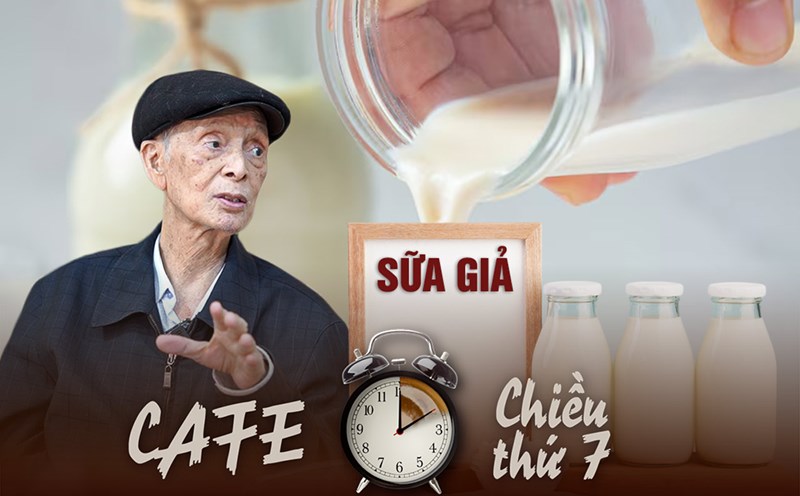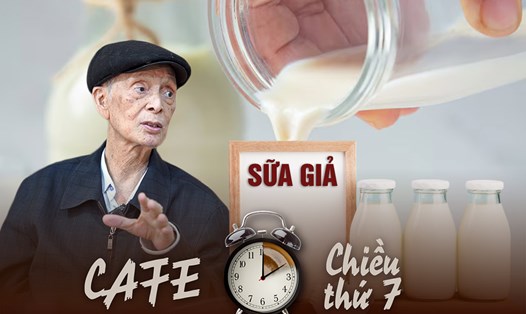Patients are confused and worried
The area around K Hospital, Tan Trieu facility (Thanh Tri, Hanoi) - which treats thousands of cancer patients has long been a "fertile land" for many milk businesses. According to the reporter's records, at most pharmacies around the hospital area, powdered milk for cancer patients and people with severe illnesses that need nutritional supplements is a popular product.
Some of these products include "Auphar Colostrum Gold" milk, which is widely introduced, with a commitment to imported raw materials, high quality, and good support for the health of patients.
Coming to a pharmacy selling powdered milk for cancer patients called Linh Phuong (Cau Buu Street), a female employee at this drug store said that these products are Vietnamese, but the ingredients are imported from abroad.

However, when the reporter searched for information about this product on the internet, there was almost no clear data.
Notably, the website of Aupharma Group Joint Stock Company (Auphar Colostrum Gold powder milk producer) at the address "https://aupharma.vn/san-pham/colostrum-gold/" is currently locked, and the product link cannot be accessed.

On social networks, this enterprise posted many articles to receive full consultation and high-quality starch production services including: Formula research consultation; Product market design; registered for product declaration documents; Product processing; Product promotion marketing services...

But when the reporter contacted the hotline, the company's staff replied in a contradictory way: "I called the wrong number, we don't make powdered milk anymore", raising doubts about the transparency and reputation of this product.
According to the advertisement about Auphar Colostrum Gold milk on the website of a pharmacy located at 61 lane 105/2 Xuan La, Xuan Tao (Bac Tu Liem, Hanoi), this milk is made with a new recipe with 24-hour milk and raw bird's nest powder imported from Australia. This is a specialized solution for patients and post-disease patients, helping to heal wounds, boost the immune system to the maximum for people after surgery, and help prevent the development of cancer cells. Combined with Fucoidan to increase antibodies, enhance immunity, fight oxidation, limit aging and have been clinically proven healthy immunity...
However, on the packaging, the manufacturer only lists the ingredients in the milk without clearly stating the content of each substance.
Surprised by the milk sales consultation of a pharmacy employee next to Tan Trieu K Hospital
Holding a series of photos taken of milk products including Auphar Colostrum Gold in hand, continuing to act as a buyer, the reporter went to An An Pharmacy, a place specializing in selling milk products and pharmaceuticals, functional foods on Cau Buu Street (opposite the gate of Hospital K).
Here, the pharmacy staff affirmed that Auphar Colostrum Gold is "grass milk" - a term referring to poor quality products and advising consumers to be vigilant.
Meanwhile, at Chinh An pharmacy system (the foot of Cau Buu walking bridge), the consultant affirmed that he was confident about the quality of the milk products being sold, saying that these were all genuine Vietnamese products, recognized by the Ministry of Health and prescribed by doctors at K Hospital.
When the reporter raised the issue of concerns about fake milk and product quality, a female employee admitted that many starch products are classified as "counterfeit" just because they lack the content of some quality indicators, and "not necessarily harm their health".
According to this female employee, in fact, fake milk products are essentially due to the regulation that milk with quality indicators for some key substances is only below 70% of the advertised level, and will be identified as fake goods.

"There are products that lack quality, only reaching 68 - 69%, and will all be counterfeit. So it is not certain where these milks are containing any toxicity. Customers need to understand that, even for daily use products. People make fake powdered milk as well as make sugar and eat less cement," this seller confided.
When the reporter asked if the milk products she sold were of low quality, the female employee replied hesitantly and admitted: "This milk is not counterfeit, but it is a product with only a little content, so there is no need to worry too much about where people have any toxic substances, just a little content".
Seeing that the reporter still did not really trust her, the female employee continued to convince her: "Now I just go to ask the patients if there is any problem with drinking and seeing them? Many of my family members who drink it are still healthy and have gained weight.
However, these vague explanations cannot erase the anxiety in consumers, especially when cancer patients are a particularly health- sensitive group and also a major customer of these products.
Patient powdered milk market: Mixed gold
Not only at pharmacies, powdered milk and milk for direct consumption to patients are also widely sold in boarding houses near hospitals.
flyers and advertising signs along the path, introducing many types of milk "supporting cancer treatment", "recovering health after surgery" with foreign names that sound very "confused", but their real origin is difficult to prove.
A direct milk product called Nutricia Fortisip is heavily advertised for cancer patients and people after surgery. When reporters use the QR-Code on advertising leaflets, the website link is no longer working, and hotlines cannot be contacted.
Notably, when the reporter visited the stores in the "Good Milk" system, the hotline employee admitted that the unit had distributed Nutricia Fortisip products, but the direct sales staff at the store denied this and confirmed that they had never sold fortisip milk.

These details show that tracing the origin of products on the market today is extremely difficult, even for the most cautious consumers.
Patients and their families easily become targets for the subjects to profit from the dairy business. Taking advantage of the desire to recover quickly and hope to find products to support the treatment process, many people have fallen into the trap of sophisticated marketing tricks.
During the recording process, many patients treated at K Hospital admitted to having bought milk according to a doctor's prescription, or ordered it through social media channels, trusting attractive advertisements.
Many people said that after the case of fake milk was exposed, they fell into a confused mentality, not daring to continue using products of unknown origin.
Some people even abandon the products they have bought, or use them for animals to avoid wasting, but concerns about potential health impacts are still ringing in place.
This reality poses an urgent need for authorities to tighten the inspection and supervision of the supplementary food market, especially products containing powdered milk targeting patients.












